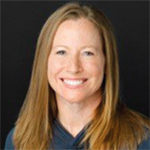If you want to specialize, but a niche isn’t jumping out, Dr. Edwards suggests looking over the entire spectrum of rheumatic diseases, physiologic processes, treatment approaches and patient care venues and focusing on the niche that speaks to you the most.
Then, learn the history of the niche. “If it’s still appealing to you, then read everything that is published on the topic and get to know the current experts in the field,” Dr. Edwards says.

Dr. Arnold
Dr. Samuels brings up another point to keep in mind. “While it is important to consider pursuing the aspect of rheumatology that most interests you, you should also pay attention to diseases and sub-disciplines that have not received enough emphasis and support in your institution or local community,” he says. “The latter may make it easier to establish and build a reputation as an expert within a niche. Another approach would be to find a niche that already exists with a more senior physician or investigator. [That way], you might have access to a large clinical or research database [or active cohort] and [be able to] make your own mark with another investigation. In this scenario, a good mentor might facilitate your development.”
Creating a Niche
If you move forward with establishing a niche of your own, you need to become a true student of the disease and a real expert. “Only study and seek to specialize in diseases for which you are truly fascinated and enjoy evaluating; see a lot of patients along with an established senior expert, and, if possible, see patients at a program that specializes and participates in research of that disease,” Dr. Merkel says.
For 12 years, Dr. Arnold worked with her father in a practice comprising 80 orthopedic surgeons and 10 rheumatologists. “There were not a lot of rheumatologists, so we saw a large variety of patients. Over the years, patients with certain therapies and diagnostics excited me,” she recalls, so she started limiting the other types of patients she would see.
In June 2014, Dr. Arnold and her father started their own practice. Initially, the practice served all rheumatology patients. But recently, they began limiting new patients to only those with RA, OA and other forms of inflammatory arthritis. “The key is to slowly limit the [number] of patients you see with other illnesses,” she says. The duo also created an environment that complements their interests, which includes diagnostic ultrasound, an infusion center and an exercise facility. These are all essential in caring for patients with inflammatory arthritis.


